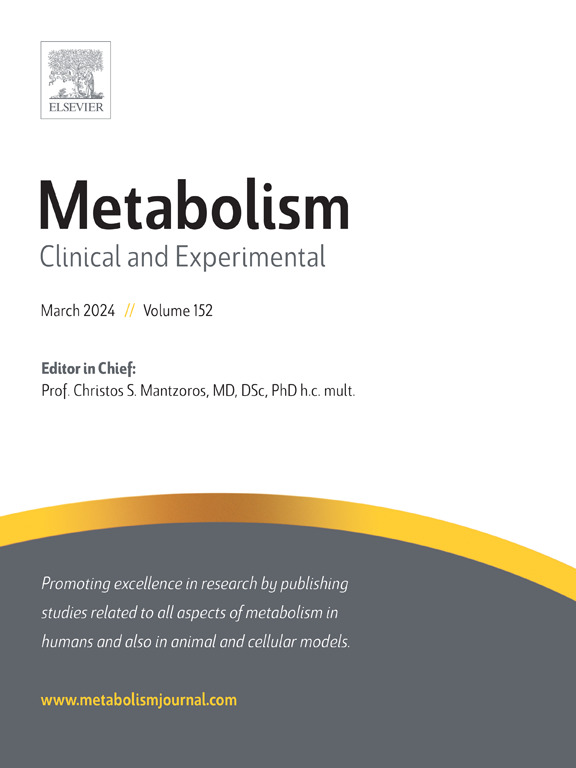瘦素临床研究的证据:目前和未来在人体中的临床应用
IF 10.8
1区 医学
Q1 ENDOCRINOLOGY & METABOLISM
引用次数: 0
摘要
瘦素已被确定为脂肪组织分泌激素的原型,也是多种人体生理功能的主要调节因子。在此,我们将主要回顾在人体中施用瘦素的研究结果。我们将描述在瘦素缺乏的情况下,如健康人短期禁食、运动中相对能量缺乏(REDS)、先天性瘦素缺乏(CLD)、全身性(GL)和部分性脂肪营养不良(PL)、艾滋病相关性脂肪营养不良(HIV-L),以及在瘦素过剩的情况下(常见肥胖、2 型糖尿病、脂肪肝),瘦素替代对代谢、内分泌和免疫学的影响。我们将这些结果与临床前模型的研究结果进行了比较,并就瘦素在人体生理学、病理生理学和治疗学中的作用提出了主要结论。我们得出的结论是,在能量缺乏的条件下,瘦素替代品可通过降低食欲有效减轻体重和脂肪量,改善高甘油三酯血症、胰岛素抵抗和肝脂肪变性(尤其是在 GL 和 PL 中),恢复神经内分泌功能(尤其是促性腺轴),调节适应性免疫系统细胞群,改善骨骼健康。相反,在瘦素过剩的情况下,如普通肥胖症和 2 型糖尿病,瘦素治疗并不能改善任何代谢异常。在动物实验中,克服肥胖症和 2 型糖尿病患者瘦素耐受性/抵抗性的策略取得了令人鼓舞的结果,但这些结果应在随机临床试验中对人体进行测试。本文章由计算机程序翻译,如有差异,请以英文原文为准。
Evidence from clinical studies of leptin: current and future clinical applications in humans
Leptin has been established as the prototype adipose tissue secreted hormone and as a major regulator of several human physiology functions. Here, we are primarily reviewing the findings from studies in humans involving leptin administration. We are describing the metabolic, endocrine and immunologic effects of leptin replacement in conditions of leptin deficiency, such as short-term fasting in healthy individuals, relative energy deficiency in sports (RED![]() S), congenital leptin deficiency (CLD), generalized (GL) and partial lipodystrophy (PL), HIV-associated lipodystrophy (HIV-L) and of leptin treatment in conditions of leptin excess (common obesity, type 2 diabetes, steatotic liver disease). We are comparing the results with the findings from preclinical models and present the main conclusions regarding the role of leptin in human physiology, pathophysiology and therapeutics. We conclude that, in conditions of energy deficiency, leptin substitution effectively reduces body weight and fat mass through reduction of appetite, it improves hypertriglyceridemia, insulin resistance and hepatic steatosis (especially in GL and PL), it restores neuroendocrine function (especially the gonadotropic axis), it regulates adaptive immune system cell populations and it improves bone health. On the contrary, leptin treatment in conditions of leptin excess, such as common obesity and type 2 diabetes, does not improve any metabolic abnormalities. Strategies to overcome leptin tolerance/resistance in obesity and type 2 diabetes have provided promising results in animal studies, which should though be tested in humans in randomized clinical trials.
S), congenital leptin deficiency (CLD), generalized (GL) and partial lipodystrophy (PL), HIV-associated lipodystrophy (HIV-L) and of leptin treatment in conditions of leptin excess (common obesity, type 2 diabetes, steatotic liver disease). We are comparing the results with the findings from preclinical models and present the main conclusions regarding the role of leptin in human physiology, pathophysiology and therapeutics. We conclude that, in conditions of energy deficiency, leptin substitution effectively reduces body weight and fat mass through reduction of appetite, it improves hypertriglyceridemia, insulin resistance and hepatic steatosis (especially in GL and PL), it restores neuroendocrine function (especially the gonadotropic axis), it regulates adaptive immune system cell populations and it improves bone health. On the contrary, leptin treatment in conditions of leptin excess, such as common obesity and type 2 diabetes, does not improve any metabolic abnormalities. Strategies to overcome leptin tolerance/resistance in obesity and type 2 diabetes have provided promising results in animal studies, which should though be tested in humans in randomized clinical trials.
求助全文
通过发布文献求助,成功后即可免费获取论文全文。
去求助
来源期刊

Metabolism: clinical and experimental
医学-内分泌学与代谢
CiteScore
18.90
自引率
3.10%
发文量
310
审稿时长
16 days
期刊介绍:
Metabolism upholds research excellence by disseminating high-quality original research, reviews, editorials, and commentaries covering all facets of human metabolism.
Consideration for publication in Metabolism extends to studies in humans, animal, and cellular models, with a particular emphasis on work demonstrating strong translational potential.
The journal addresses a range of topics, including:
- Energy Expenditure and Obesity
- Metabolic Syndrome, Prediabetes, and Diabetes
- Nutrition, Exercise, and the Environment
- Genetics and Genomics, Proteomics, and Metabolomics
- Carbohydrate, Lipid, and Protein Metabolism
- Endocrinology and Hypertension
- Mineral and Bone Metabolism
- Cardiovascular Diseases and Malignancies
- Inflammation in metabolism and immunometabolism
 求助内容:
求助内容: 应助结果提醒方式:
应助结果提醒方式:


